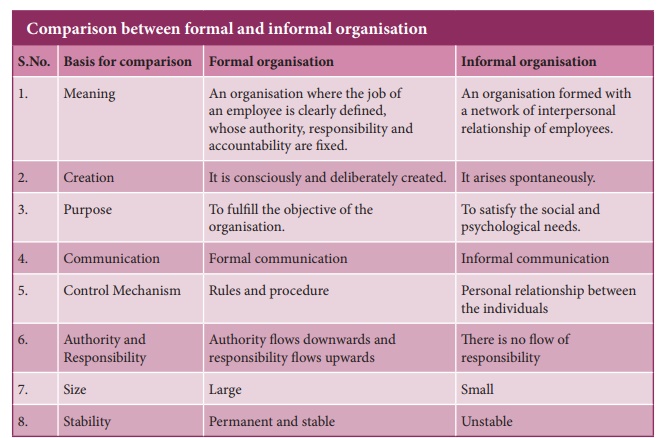Definition, Merits, Demerits - Formal and informal organisation | 12th Office Management and Secretaryship : Chapter 3 : Organising Function
Chapter: 12th Office Management and Secretaryship : Chapter 3 : Organising Function
Formal and informal organisation
Formal and informal organisation
Formal organisation
Formal organisation: Formal organisation deliberately and
consciously creates for the accomplishment of organisational goal. Organisation
is a well-defined structure of authority and responsibility that defines
delegation of authority and relationship amongst the organisational members. It
provides official relationships between the individuals. The communication
channel in a formal organisation is also official. Rules and procedures are well
defined in formal organisation. Formal organisation facilitates coordination,
integration of the diverse departments within an enterprise.
Definition of Formal organisation
According to
M. P. Sharma, “Formal organisation means the organisation as deliberately
planned, designed and duly sanctioned by competent authority”.
In the words
of Barnard, “Formal organisation is a system of consciously
coordinated activities or forces of two or more persons”.
Merits of formal organisation
1. Systematic working:
Formal organisation
structure results in systematic and smooth functioning of an
organisation.
2. Achievement
of organisational objectives: It is established to achieve organisational
objectives without any confusion.
3. No
overlapping of work: Informal organisation’s work is systematically divided
among various departments and employees. So there is no chance for overlapping
of work.
4. Co-ordination:
It results in coordinating the activities of various departments to attain the
common goal.
5. Creation of
chain of command: Formal organisational structure clearly defines superior
subordinate relationship i.e., who should report to whom?
6. More emphasis
on work: Formal organisational structure lays more emphasis on work than
interpersonal relations.
Demerits of formal organisations
1. Delay: The
actions will get delayed because of following chain of command and scalar
chain.
2. Ignores
social needs of employees: It does not give importance to social needs of
employees which may lead to demotion of employees.
3. Emphasis on
work only: It ignores creativity, human relations, talents etc and give
importance to work only.
Informal organisation
Informal
organisation is the outcome of personal and social relationship between the
individuals and the organisation. It develops spontaneously as the result of
interactions between persons. It exists outside the formal authority system,
without any set of rigid rules. It was first systematically explored in the
pioneering studies carried on by Elton Mayo and others at the Hawthorne plant
of west ern Electric Company. It exists in all the offices such as Government,
Private, Public and in business also. In Informal organisation there are no
written rules like Formal organisation. It cannot be forced or controlled by
the management. There is no defined structure for communication.
Definition
According to
Chester Barnard, “Informal organisations
as the aggregate of personal contacts and interactions and the associated group
of people, such organisations is indefinite, structures less and are shapeless
mass of varied densities”.
Merits of informal organisation
1. Fast
Communication: It does follow scalar chain, so the communication will spread
faster.
2. Fulfills
social needs: It gives importance to psychological and social needs of
employees which motivate the employees.
3. Correct feedback: Though the group is informal, they don’t have the fear of the boss, so the employers at top level may get the correct feedback from employees of various departments.
Demerits of informal organisation
1. No smooth
flow of work: Working in informal organisation will not be systematic, so there
will be no smooth flow of work.
2. Spread
rumours: The information may adopt a casual approach to work in an informal
atmosphere. This may affect the quality of work.
Comparison between formal and informal organisation

Related Topics